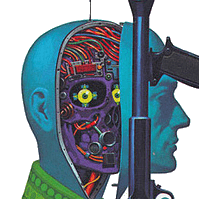Leftists are communist though. Liberals are the progressives that prefer capitalism
No, I disagree with each of your definitions. Here’s how I see them:
- leftist - anyone left of center; this is a big tent with both capitalists and communists
- progressives - leftists who want significant, but moderate political change (e.g. universal healthcare, high minimum wage, etc)
- liberals - anyone who believes in individual rights and private property, so basically the capitalist wing of leftist ideology; originally, liberals were more synonymous w/ modern libertarians, but now they tend to prefer larger government
So in terms of size of the groups: leftists > liberals > progressives. The communist part of the left is largely mutually exclusive from progressives and liberals, though some progressives are in favor of some elements from socialism.
At least that’s how I see it. I’m neither leftist or conservative, I’m a pretty centrist libertarian. I’m left of many leftists and right of many conservatives, depending on the issue.
You may disagree, but it is a pretty widely agreed upon distinction. It’s a symptom of the issue of a fractured left wing. The left leaning communists wanted to distinguish themselves from the left leaning capitalists, so they started calling themselves leftists and not liberals.
It’s just a bunch of different labels, it’s not really set in stone or definitive. I totally understand why you disagree.
My point really was just that a conservative calling someone a communist isn’t insulting to a lot of self described leftists because they are communist, it’s mostly just considered an insult to a conservative. Kinda like calling an alt right person a Nazi is an insult from a leftist, but plenty of alt righties wouldn’t be insulted because they are (jk but not really but jk)
The left leaning communists wanted to distinguish themselves from the left leaning capitalists, so they started calling themselves leftists and not liberals.
I don’t really care what they call themselves, I care what people in general mean by the terms they use. Academics use “leftist” to mean anyone on the left, “liberals” to mean those who prioritize individual liberties and private property (e.g. founders of the US), and “progressives” to mean those interested in utilitarian changes to existing systems to improve outcomes. “Liberal” has change a bit recently with the right using it to describe the left, but it’s also not wrong because both Dems and Reps are liberals, Reps are just socially conservative liberals, and Dems are socially progressive liberals. Those have clear definitions that are generally understood by the public, and changing their meaning just confuses things IMO.
My point really was just that a conservative calling someone a communist isn’t insulting to a lot of self described leftists because they are communist
But most aren’t. Calling Biden a communist because he wants to expand access to medical care is similar to calling Trump a fascist because he wants stronger border protections. They’re just inflammatory, inaccurate labels used for political gain. The communist label is relying on the “red scare” nonsense, and the fascist label is relying on holocaust imagery. Both are inaccurate and harmful IMO.
Yes, there are legitimate communists on the left and legitimate fascists on the right, but they’re such a minority that using them for any public figure is almost guaranteed to be inaccurate.
Liberalism is not necessarily capitalist. It is possible to be an anti-capitalist liberal by recognizing the inalienable right to workplace democracy @technology
I don’t think that’s true, at least not given the classical definition found here on Wikipedia. In general, I think John Locke embodies liberalism really well, and he believed in a natural right to life, liberty, and property. So to me, property has been a foundational part of liberalism since its creation.
Then again, a lot of people use “liberal” to essentially be the same as “leftist,” meaning anyone left of center. But I think that’s silly, because in my eyes and using the academic definition of liberalism, both the Democratic Party and Republican Party have strong liberal roots, and they’re different in where they deviate from that (Democrats are weak on property rights and free markets, Republicans are weak on civil liberties and secularism).
If you’re anti-capitalist, by definition you’re not a liberal IMO. And I think most people who claim to be anti-capitalist aren’t actually anti-capitalist (can’t speak for you though), they’re just frustrated at our corrupted form of capitalism. A purer form of capitalism (less protectionism, i.e. fewer IP protections, fewer options to limit liability, etc) accompanied with a healthy safety net (e.g. something like UBI) and worker protections is probably more than adequate to most who espouse anti-capitalist sentiment.






